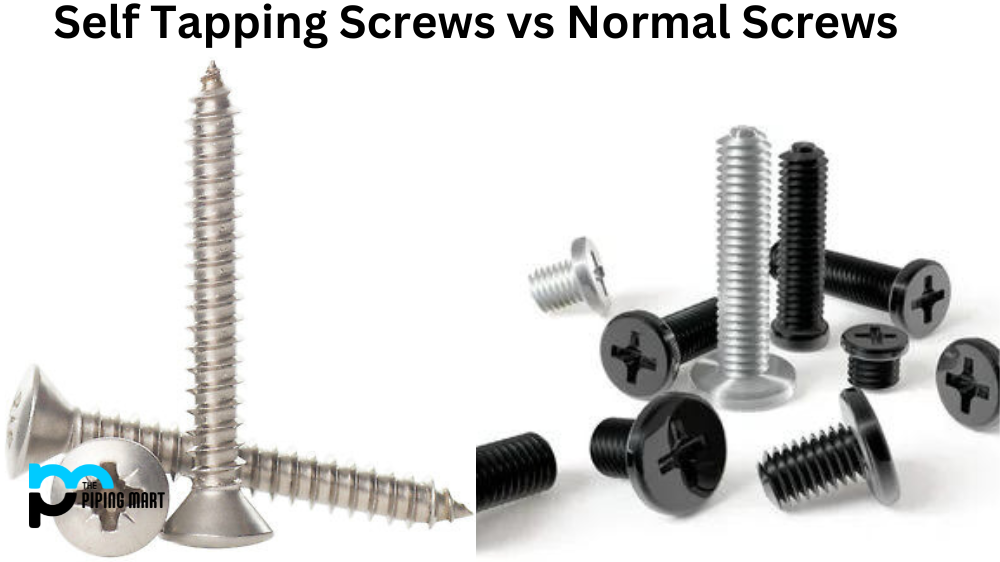Self Tapping Screws vs Normal Screws – What’s the Difference
| 3:24 am


Screws are an everyday item we use daily, from repairing household appliances to building construction projects. However, when it comes to choosing the correct screw for the task, it can get confusing as many types of screws are available in the market. One major decision that one has to make while choosing screws is whether to go for self-tapping screws or standard screws.
In this article, we will discuss the differences between self-tapping screws and regular screws, their uses, and which is suitable for what kind of work. Let’s dive in!
What is Self-Tapping Screw?
Self-tapping screws have an extra feature that allows them to cut threads and create the needed anchor point in a material without pre-drilling a hole. Some of the most common materials that self-tapping screws work well with include aluminium, plastic, and softwood. These screws are plentiful in various industries, including automotive engineering, electronics, and furniture.
The critical advantage of self-tapping screws is that they reduce installation time by eliminating the need for a pre-drilled hole. They also provide greater pulling-out strength and holding power than regular screws, making them ideal for applications requiring a secure and long-lasting connection.
What is Normal Screw?
Regular screws require a pre-drilled hole in the material before being implanted. These screws have a single threading that creates a bond and holds a material together.
Regular screws come in various sizes and shapes and are used for multiple applications, such as fastening two components, preventing two surfaces from separating, or as part of anchoring systems. These screws are used where reliability and strength are critical factors.
Difference Between Self Tapping Screws and Normal Screws
The best screw is usually determined by one’s requirements and the material used. For example, self-tapping screws may work best for plastic but may not be ideal for metal, requiring a drilled hole to prepare the surface. Critical factors in selecting the screw type include the number of parts to join, the material’s tensile strength, and the final application.
Regardless of the selection process, proper drill-bit size and hole preparation are crucial for any project that requires screws. This ensures that the screws’ threading engages correctly, creating a secure connection.
Tips for Using Screws
- When fastening two objects, ensure flat surfaces to improve accuracy and contact.
- Clearly understand the screw’s size or measurement and determine the correct driver bit for proper installation.
- Consider the load-bearing capacity of the screw to ensure that the weight or load at the secured object doesn’t force the screw to pull out of the material.
- Ensure the surface is appropriately prepared, including coating the screws with an anti-corrosive agent for extended lifespan and reduced rust issues.
- Self-tapping screws are screws that are designed to tap their own threads as they are driven into a material. This type of screw is typically used in applications where it is not possible or convenient to tap the lines beforehand.
- Standard screws, on the other hand, do not have this ability and must have their threads tapped beforehand.
- Self-tapping screws are made from various materials, including steel, stainless steel, brass, and bronze.
- Standard screws are also made from various materials, typically from softer metals like aluminium and copper.
- Self-tapping screws are typically more expensive than standard screws.
Conclusion
In conclusion, selecting the right screw for a particular job ensures your project succeeds. While self-tapping screws are suitable for ease of installation, they may not work well in high-stress situations. In contrast, regular screws offer exceptional pulling-out strength, making them ideal for heavy-duty work. The decision as to whether to use self-tapping screws or standard screws depends on the job’s requirements and the materials’ tensile strength. Proper pre-drilling, hole preparation, and fastening techniques ensure the screws work correctly and provide reliable long-term service.


Meet Bhavesh, a seasoned blogger with a wealth of knowledge and experience. From metal products manufacturing to retail, Bhavesh has a diverse background in various industries and is dedicated to sharing his insights and expertise with readers.